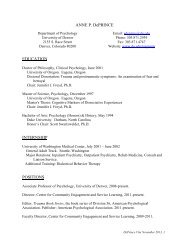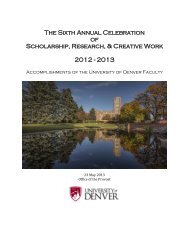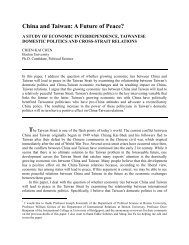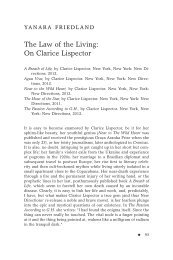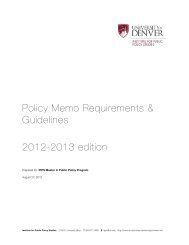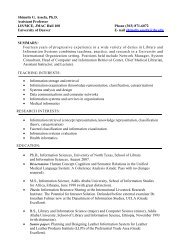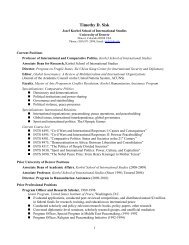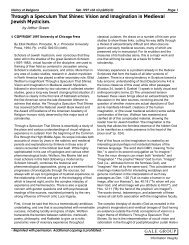You also want an ePaper? Increase the reach of your titles
YUMPU automatically turns print PDFs into web optimized ePapers that Google loves.
Intercultural Competence<br />
and Social Work<br />
by Clinical Assistant Pr<strong>of</strong>essor Stephen von Merz, MSW ’03, LCSW-CO<br />
As Coordinator <strong>of</strong> <strong>GSSW</strong>’s Social Work with Latinos/as Certificate,<br />
I’ve had the pleasure <strong>of</strong> accompanying four groups <strong>of</strong> MSW<br />
students to Mexico over the past three years. The trip is a key<br />
component <strong>of</strong> the MSW course, “Global Relations and Poverty in<br />
Mexico,” which I teach in Spanish as one <strong>of</strong> the requirements for<br />
students earning the Latino Certificate. The course is also taught<br />
in English by Associate Pr<strong>of</strong>essor Lynn Parker for non-Certificate<br />
MSW students.<br />
The demand for social workers who are linguistically and culturally<br />
equipped to work with Latinos and Latinas remains high, and I<br />
believe there is no better way to learn these skills than by being<br />
immersed in a Spanish-speaking setting. Because Mexicans are the<br />
fastest-growing immigrant group in the United States, it is critical<br />
for students to gain knowledge about Mexican culture at the same<br />
time they hear, practice and conceptualize the Spanish language<br />
in its natural environment. When they return home, the students<br />
bring with them concepts <strong>of</strong> global and transnational justice, and<br />
what the United Nations Universal Declaration <strong>of</strong> Human Rights<br />
calls a “universal respect for, and observance <strong>of</strong>, human rights and<br />
fundamental freedoms.”<br />
Offered twice each year, the Mexico course provides a mixture <strong>of</strong><br />
experiential and academic education based on the communitylearning<br />
model <strong>of</strong> Brazilian educator Paulo Freire. Friere’s<br />
educational philosophy holds that oppressed individuals must<br />
play a role in their own liberation, and that, if true liberation is to<br />
occur, the oppressors must also be willing to rethink their way <strong>of</strong><br />
life and to examine their own role in the oppression. Within that<br />
framework, the <strong>GSSW</strong> course covers aspects <strong>of</strong> Mexican culture,<br />
community development, historical patterns <strong>of</strong> oppression,<br />
spirituality and liberation theology, global economics and policy,<br />
as well as the role <strong>of</strong> indigenous movements.<br />
Our two-week journey to Mexico begins with several thoughtprovoking<br />
lectures by academic scholars and community leaders.<br />
Faculty from the Universidad Nacional Autónoma de México<br />
(National Autonomous <strong>University</strong> <strong>of</strong> Mexico) provide an overview<br />
<strong>of</strong> recent political and economic reforms, and <strong>of</strong> the ways other<br />
countries’ policies impact Mexico and its people. Members <strong>of</strong><br />
the women’s health community, like community social worker<br />
Carmen Granados, address topics such as breast cancer, familial<br />
violence and women’s rights. Granados also provides students<br />
with firsthand information about her work with the physically<br />
4 spring 12 where in the world is <strong>GSSW</strong>?<br />
and emotionally wounded residents <strong>of</strong> the Mexican state <strong>of</strong><br />
Chiapas and on the border in Ciudad Juarez, one <strong>of</strong> the world’s<br />
most dangerous cities.<br />
During their time in Mexico, our students engage in critical<br />
dialogue and service with indigenous groups, natural and spiritual<br />
healers, local social service pr<strong>of</strong>essionals and faculty members<br />
from neighboring universities. We also explore numerous<br />
prevention and intervention strategies being used to treat the<br />
innocent children, youth and families who have been impacted<br />
by the increased violence along the border—strategies that<br />
include community organizing efforts, the use <strong>of</strong> spiritual leaders<br />
to address physical and mental health concerns, and the use <strong>of</strong><br />
natural healers who create floral remedies to treat a variety <strong>of</strong><br />
ailments and diseases. Our days are packed full <strong>of</strong> activities meant<br />
to prepare students for the rigorous occupations they will hold<br />
when working with one <strong>of</strong> the largest Spanish-speaking groups in<br />
the United States.<br />
I’m proud <strong>of</strong> the commitment our students make to becoming<br />
effective and culturally responsive social workers by building<br />
relationships with people from different cultures. My hope is that<br />
all people who work with marginalized immigrant groups discover<br />
the value and richness inherent in getting to know people who<br />
are different from themselves. Cultural differences among nations<br />
<strong>of</strong>ten create misunderstandings and fear, but it’s how we respond<br />
to those differences that sets the social work pr<strong>of</strong>ession apart. I’m<br />
convinced that there really can be “justice for all” if we learn to value<br />
the things that make us both unique and diverse as global citizens.<br />
Making Connections in Mexico<br />
by Aaron Green, concentration year MSW student<br />
Last August, I was one <strong>of</strong> the students who traveled to the Mexican<br />
State <strong>of</strong> Puebla as part <strong>of</strong> “Global Relations and Poverty in Mexico,” a<br />
required course in the Social Work with Latinos/as Certificate.<br />
One <strong>of</strong> our lectures focused on how foreign policies and international<br />
corporations affect Mexican policies and, in turn, the lives <strong>of</strong> the<br />
Mexican people. We also began to reflect on how these policies<br />
affect the lives <strong>of</strong> the clients we work with in the States.<br />
One <strong>of</strong> the most impactful themes <strong>of</strong> the trip was making<br />
connections between the North American Free Trade Agreement<br />
(NAFTA) and the daily lives <strong>of</strong> the Mexican people. I observed<br />
that NAFTA created economic hardships on two fronts: First, it<br />
introduced foreign competition into Mexico so Mexican farmers<br />
and small businesses could no longer compete economically with<br />
large international corporations. Second, it created thousands <strong>of</strong><br />
factories in Mexico where the workers make almost nothing and<br />
work in very dangerous conditions.<br />
These economic realities have resulted in mass migration. We<br />
spoke with indigenous mothers, orphans and elderly people<br />
who described how America’s economic policies necessitated<br />
that they and their families migrate from their rural Mexican<br />
homeland either into urban areas or across the border into the<br />
United States.<br />
While the economic situation<br />
we observed in Mexico is<br />
discouraging, we also had<br />
several experiences that gave<br />
me hope. We spent a day with a<br />
social service agency that works<br />
with “street children,” providing<br />
services such as residential<br />
treatment and individual, group<br />
and family therapy. I had the<br />
opportunity to join two therapists on a<br />
home-based therapy session, and it was one<br />
<strong>of</strong> the most interesting hours <strong>of</strong> the trip.<br />
Although this family faced oppression<br />
in every aspect <strong>of</strong> their lives, the session<br />
helped empower the family members,<br />
and they reported positive reactions to the<br />
intervention. Even though I observed just<br />
one session with just one <strong>of</strong> the millions<br />
<strong>of</strong> oppressed families in Mexico, I was<br />
encouraged that the therapists could partner<br />
with the family to make a positive change in<br />
their lives, and this gave me hope.<br />
Perhaps the most important element <strong>of</strong> the trip was gaining<br />
a clearer understanding <strong>of</strong> the systems the affect my clients<br />
here in <strong>Denver</strong> and identifying ways <strong>of</strong> providing culturally<br />
competent social services to marginalized populations in the U. S.<br />
Before visiting Puebla, I believed that many Mexicans were poor,<br />
and this was devastating. But I did not realize how some foreign<br />
policies have a direct impact on global poverty. Now I feel better<br />
prepared as a social worker to critically analyze how systems <strong>of</strong><br />
oppression affect my clients, and to identify ways to effectively<br />
challenge these systems.<br />
At a Puebla market, Aaron Green and other <strong>GSSW</strong> students<br />
shop for food to be donated to the Casa Hogar orphanage<br />
and children’s shelter.<br />
Cuetzalan ro<strong>of</strong>tops<br />
Mexico<br />
<strong>GSSW</strong> students visit the<br />
Yohualichan pyramid near<br />
Cuetzalan.<br />
where in the world is <strong>GSSW</strong>? spring 12 5



